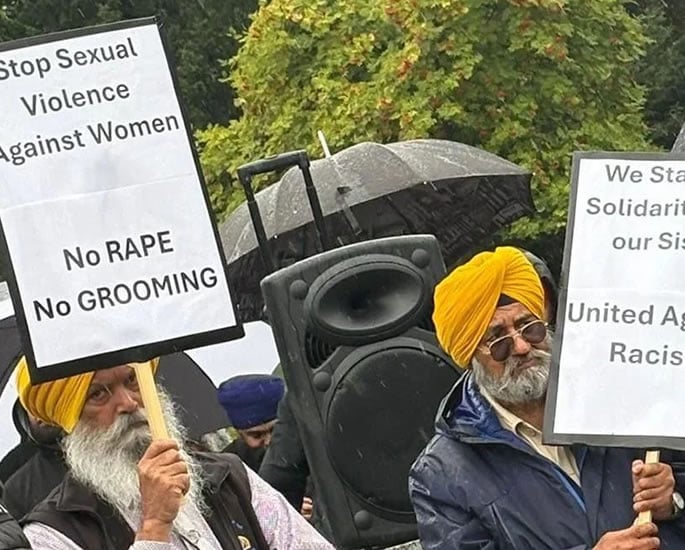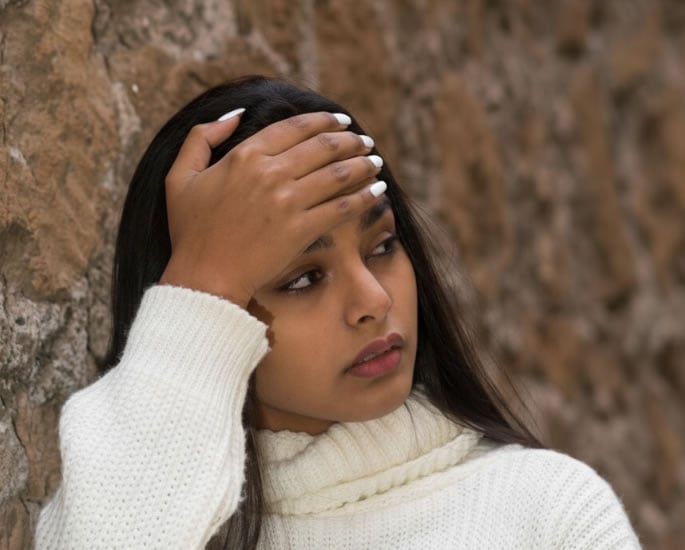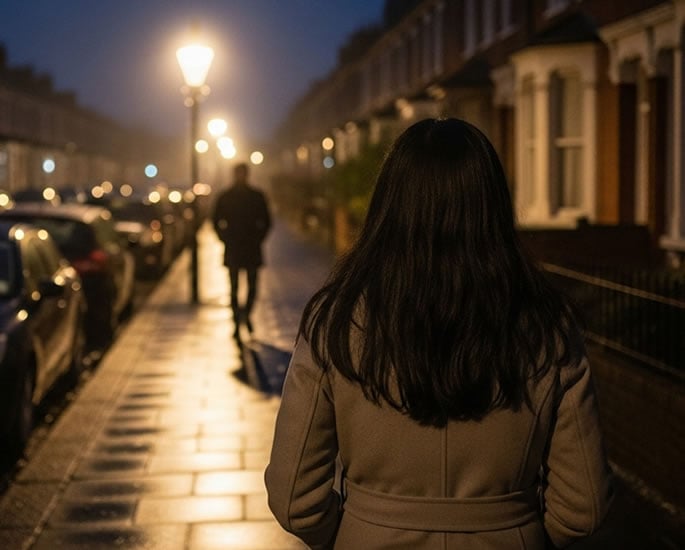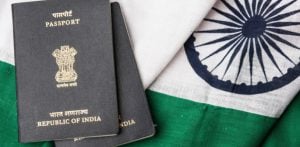"I know how real and frightening this threat is."
The recent racially-motivated rapes of two young women in the West Midlands have sent shockwaves throughout the British South Asian community.
In Oldbury, a Sikh woman was on her way to work when she was attacked by two men. During the attack, her assailants shouted:
“You don’t belong in this country, get out.”
Just weeks later, in Walsall, a Punjabi woman was raped in her own home after her attacker allegedly broke down her door. During the rape, he shouted racial slurs at her.
They were targeted attacks that combined racism and misogyny.
These attacks have also sparked worry among British South Asian women, who fear they could be targeted for their race.
As the community reels from these horrific attacks, a wider and more urgent conversation is unfolding about the safety of British South Asian women, the insidious nature of misogyny and the ever-present threat of racist violence in the UK.
We explore the intersections of racism, misogyny, and violence, with the main question being: are British South Asian women truly safe in the UK?
A Community in Shock

The response from the British South Asian community has been one of deep shock and outrage.
Community groups and MPs have spoken out, expressing their horror and demanding action.
Mus from Brummies United Against Racism and Hate Crime (BUAR) stated:
“We are angry, horrified, and upset by this brutal, sexist, and racist attack. Our thoughts are with the survivor and her family.
“Black and Brown women have told us they fear going out in case they are attacked.”
MP Preet Gill expressed her profound shock, saying:
“Deeply shocked and saddened that we are hearing of yet another racially aggravated rape this time in Walsall.
“The repeated pattern of violence against women in our region, compounded by hate and racial overtones, is deeply disturbing.”
Similarly, MP Zarah Sultana highlighted the dangerous interplay of racism and misogyny:
“These horrifying attacks show how racism and misogyny feed each other – fuelled by the rise of fascism and hate.”
“As a woman of colour, I know how real and frightening this threat is.”
These statements underscore the palpable fear and anger that have gripped the community.
The attacks have not only shattered the lives of the victims and their families but have also instilled a deep sense of vulnerability and insecurity among South Asian women across the UK.
The sentiment is echoed by many in the community, who feel that the anti-migrant rhetoric in politics and media has contributed to a climate of hate where such attacks are more likely to occur.
Racism & Misogyny

Racist attacks are not new in the UK.
But being targeted for your ethnic background and then seriously sexually assaulted is a fear that recent events have made terrifyingly real for British South Asian women.
Not only were the two victims subjected to sexual violence, but they were also racially abused.
This intersectional threat is not a new phenomenon.
South Asian feminists in Britain have long highlighted the specific experiences of Black and Minority Ethnic (BME) women, who face violence both within and outside their communities.
They have challenged the mainstream feminist movement to be more inclusive and to recognise the unique challenges faced by women of colour.
The fight for the safety of South Asian women is therefore not just a fight against misogyny but also a fight against racism and all forms of discrimination.
While concrete statistics on racially motivated sexual assaults against South Asian women are difficult to come by, the overall trend of rising hate crimes is a cause for serious concern.
In the year ending March 2021, there were 124,091 hate crimes recorded by the police in England and Wales, a 9% increase from the previous year, with the majority being racially motivated.
The rise in hate crimes is arguably fuelled by the rise in far-right movements, which inject a poison of division and suspicion into society.
This rhetoric gives a silent permission for hatred to surface and fester in our communities.
For British South Asian women, this translates into a tangible threat. They find themselves at the sharpest edge of this hostility, where deep-seated misogyny is ignited by racial prejudice.
This is the devastating reality of the double threat: an environment where a woman’s very presence can be seen as a provocation for violence.
The Reality of this Fear

For many British South Asian women, the fear of violence is a part of their daily lives.
It’s the constant need to be vigilant, to think twice about walking alone at night, and to be wary of strangers. It’s the knot in the stomach when faced with a group of men, the quickening of the pulse when a car slows down beside you.
This is the lived reality of fear that statistics alone cannot capture.
The recent attacks have intensified these fears.
As Saundarya from Birmingham shared: “It can be scary walking back from work in the evening, especially now because it gets dark earlier.
“You’re walking on an empty street and if you see a man walking towards you, it scares the hell out of you because of these incidents.”
Expressing her unease, Simran* said:
“As a Punjabi woman, and knowing what happened to those two women, I am scared to leave the house alone.
“When I do need to go out, I have a male relative come with me.
“I’ve spoken to my Asian friends and some have cancelled plans, prioritising their safety.”
This shared anxiety is a heavy burden to carry.
Priya* explained: “You always have your guard up and it’s exhausting.
“You’re not just worried about being harassed as a woman, you’re worried that someone will target you because you’re Asian.
“It feels like you have a target on your back.”
The fear is not just about physical violence; it’s also about the psychological impact.
The exposure to racist and anti-immigrant rhetoric in the media and politics can take a toll on one’s sense of belonging and safety.
It creates a climate where perpetrators of hate crimes feel emboldened and where victims are left feeling isolated and unprotected.
Calls for Safety & Support

In the wake of these horrific attacks, the British South Asian community is demanding more than just words of condemnation.
Calling for community cohesion, Zara said: “We need to look out for each other.
“It’s about creating our own networks and checking in on friends who are walking home late.”
Women are calling for concrete action to ensure the safety and well-being of women.
This includes a more robust police response to hate crimes, better support services for victims, and a concerted effort to tackle the root causes of racism and misogyny.
Organisations like Saheli, Roshni Ghar and The Sharan Project have been at the forefront of providing support to South Asian women who have experienced violence and abuse.
These organisations provide a range of services, including counselling, legal advice, and safe accommodation.
They play a crucial role in empowering women and helping them to rebuild their lives. However, these organisations are often underfunded and struggle to meet the growing demand for their services.
There is a clear need for greater investment in culturally specific support services that understand the unique challenges faced by South Asian women.
Mainstream services often lack the cultural competency to effectively support women from these communities, who may face additional barriers such as language difficulties, cultural stigma, and fear of dishonouring their families.
Aria elaborated: “I wouldn’t even know where to turn if something happened to me.
“Mainstream services don’t always understand the cultural pressures we face.
“We need more funding for South Asian support groups, run by women who look like us and understand our reality.”
The brutal attacks in the West Midlands are not just headlines; they are a stark reflection of the dual dangers of racism and misogyny that British South Asian women navigate daily.
The fear expressed by women across the country, of walking home from work, of being targeted for their faith and skin colour, is a testament to a safety crisis that cannot be ignored.
While community leaders and politicians have rightly condemned these acts, words alone are not enough.
True change requires a collective effort: a commitment from law enforcement to tackle hate crime robustly, a significant investment in culturally competent support services, and a conscious effort from all of us to challenge the divisive rhetoric that fuels such violence.
Women’s safety is not a niche issue; it is a fundamental measure of our society’s health.
It is time to move beyond shock and outrage, and towards a future where every woman, regardless of her background, can walk the streets of Britain without fear.






























































